Major U.S. airlines ran to the government to try to quash competition and a better inflight product option for passengers. Their first attempt, with the Department of Transportation, may not be working. But their next play with TSA can be done in secret and stands a better chance.
Dallas-based JSX flies regional jets that usually hold 50 seats with just 30 first class seats. This allows them to:
- operate from private terminals, instead of the main terminal at airports
- hire senior captains, often recently-retired from American Airlines and Southwest, as well as co-pilots with fewer hours in the cockpit
They do this by selling seats (part 380) on public charter flights (part 135), rather than as a regularly scheduled airline. It’s a brilliant business model that benefits from long-standing regulations, and provides a unique product to customers – show up at the airport 20 minutes before your flight, walk out to a shared private jet.

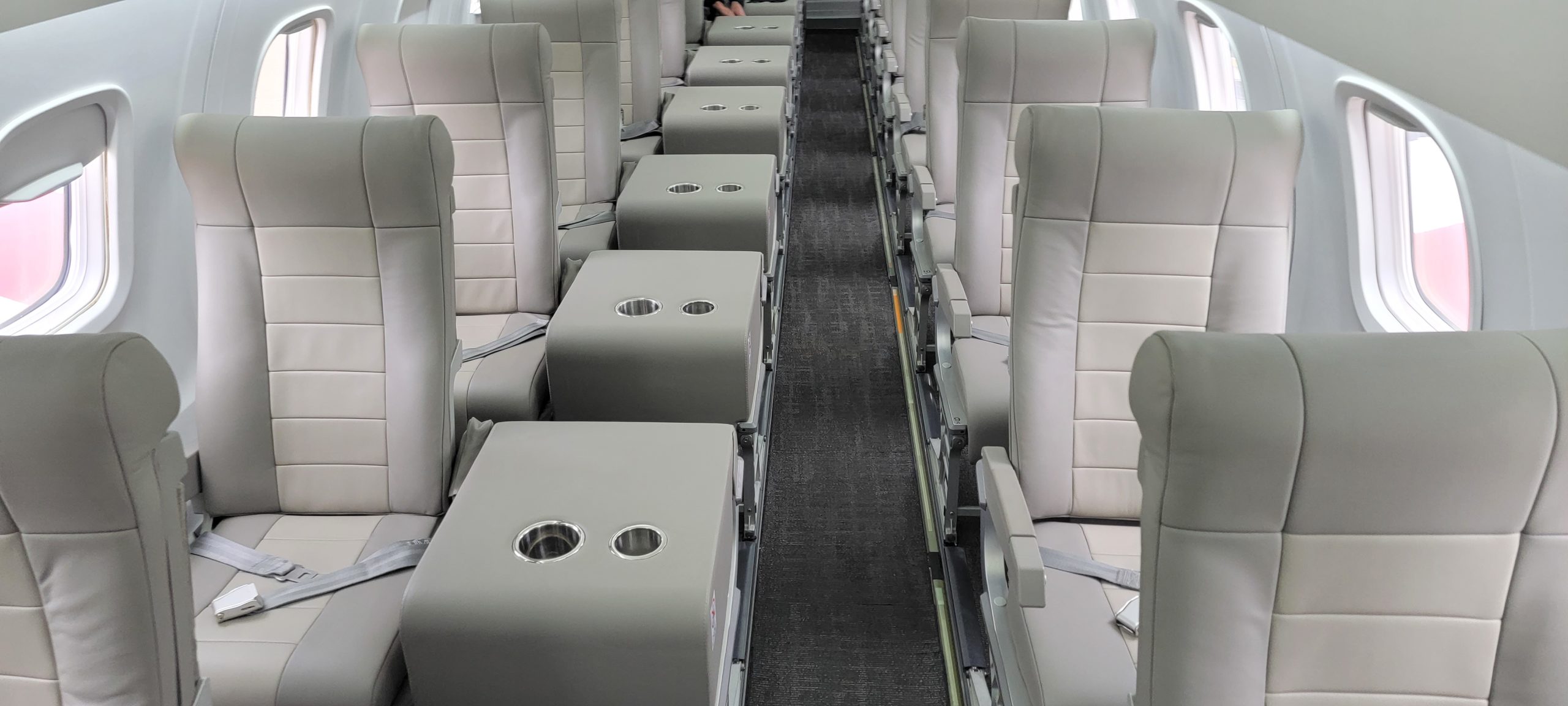
Former American Airlines Chairman and CEO has waged a public and disingenuous campaign to cajole and scare TSA into quashing competition.
He says that selling flights that depart from private terminals without TSA screening is a “national disaster just waiting to happen” that is “hopefully not being ignored, but not as urgently addressed as I think it should be.” American Airlines sells flights from private terminals without TSA screening, and did so when he was CEO of the airline.
Parker offered weird third person scare stories that don’t at all support his argument
- That a friend bottle of vodka a JSX flight and how can that be permitted? No liquid rules! Of course, airports sell ‘to go’ alcohol to passengers and JSX simply doesn’t have the inflight disturbances and diversions due to unruly passengers that American Airlines faces.
- That a friend was surprised to see JSX “look at [his] ID to make sure it matches the boarding pass” which follows the airline’s TSA-approved security program.
- And that JSX has planes, much smaller and with fewer passengers than American Airlines holds, that could be commandeered by terrorists – though everyone going onto the aircraft is screened for weapons and TSA’s record catching contraband through checkpoints is far from spotless.
Moreover, Parker never mentions or objects to the more than 4 million private flights per year that lack TSA security and indeed usually any security screening at all.
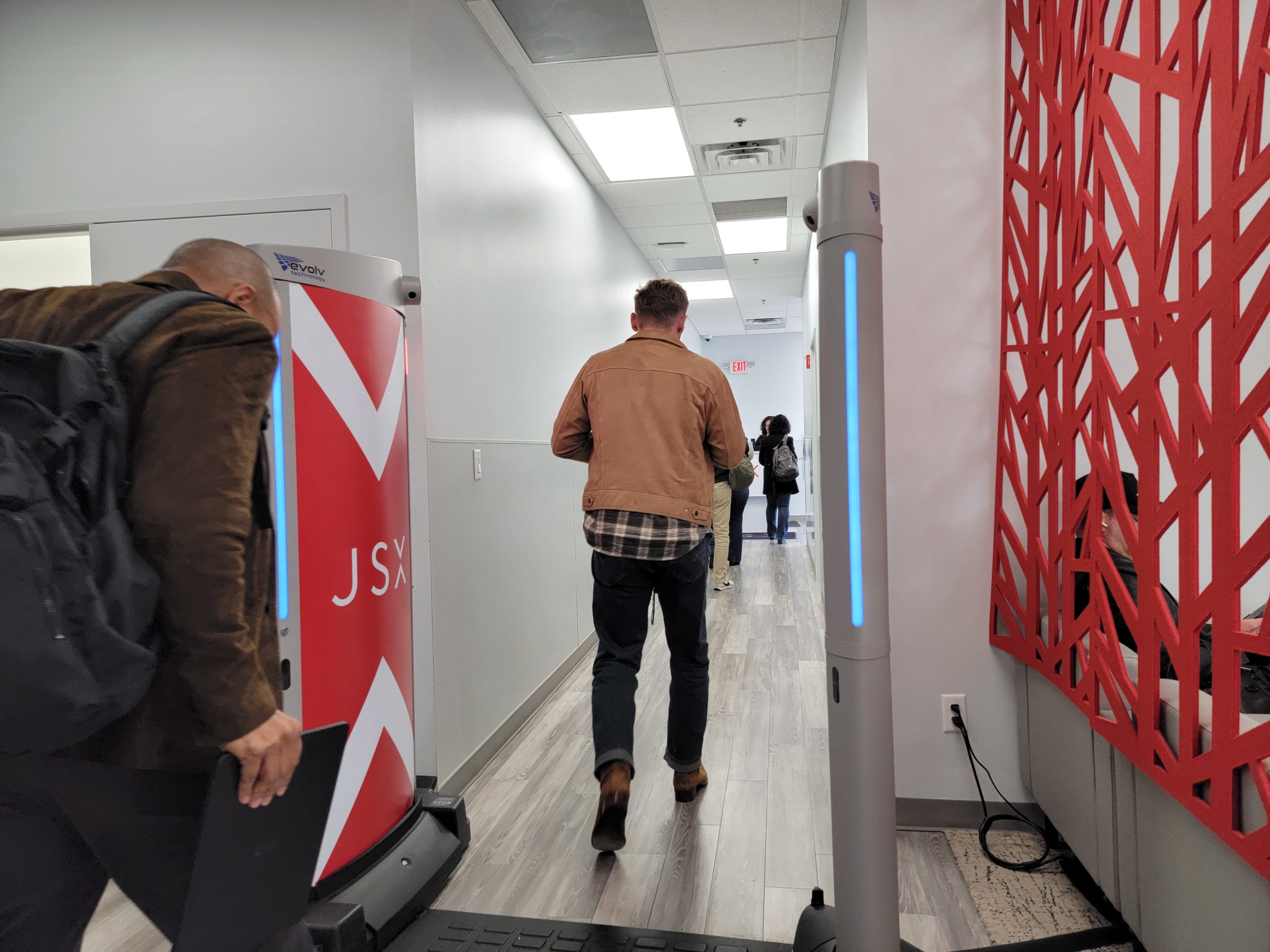
JSX Weapons Detector
It turns out that Parker’s stated concerns about JSX, with its security program that exceeds TSA standards for public charter operations and for the facilities out of which they fly, applies far more to American Airlines-sold and operated services than to JSX. Parker is indicting his own former company.
As noted by Enilria, American Airlines will sell flights departing from private terminals. They promote that TSA is optional.
The ability to customize your origin, destination, arrival or departure time, catering, and depending on your travel needs, private handling and screening as well.
You can choose to use the ‘more economical’ option of going through TSA, or pay American more to leave from a private terminal:
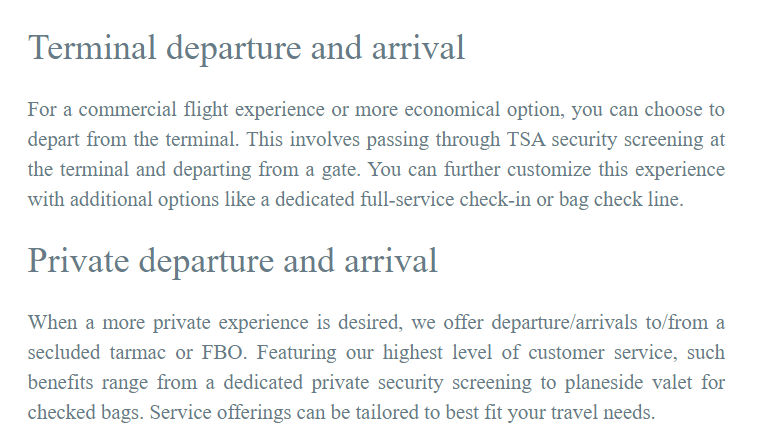
I asked American Airlines whether their security procedures measure up to what JSX puts passengers through – matching IDs (that Parker said was crucial) against government watchlists, scanning everyone for weapons. They chose not to answer, with a spokesperson offering this non-response to the question:
Aviation safety experts and workers, along with bipartisan Members of Congress, have raised serious concerns about security vulnerabilities that exist with scheduled public charter operations. These public charters are putting out a schedule to the public, they sell tickets by the seat and they operate the aircraft with more than nine seats – just like commercial airliners. Yet, they are exploiting a loophole which actively skirts security rules and regulations that were put in place after 9/11 to keep passengers safe. It is appropriate and necessary to have different rules for different operations, but any airline business model built to evade traditional security measures is concerning.
JSX security procedures exceed those of TSA’s Twelve Five Standard Security Program and is TSA-approved. Indeed, TSA expressed no concerns with JSX procedures until (as Parker explains it) the ex-American CEO and Southwest Airlines COO Andrew Watterson met with the TSA Administrator a year ago in an off the record conversation.
Southwest Airlines also, by the way, offers to sell flights from private terminals. In fact, Southwest even promotes the option of both flying private or as a public charter, the latter being what JSX sells.
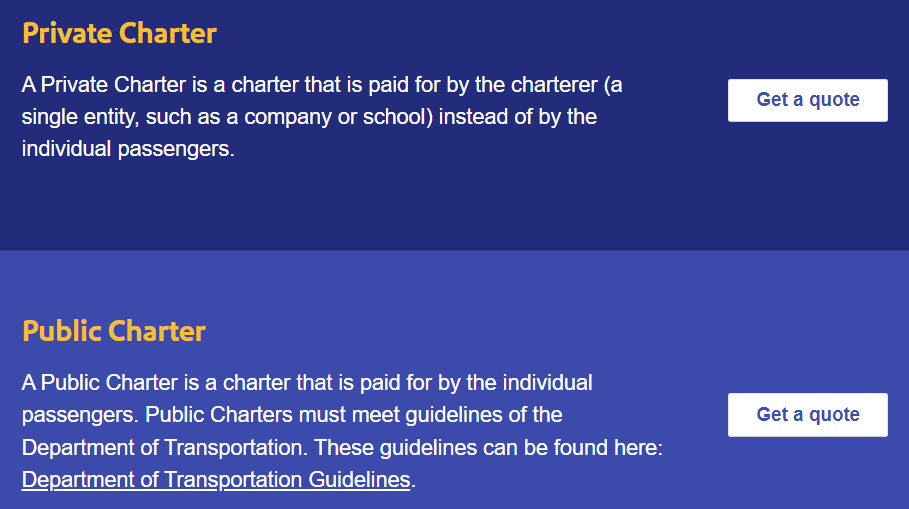
I asked Southwest whether they match JSX security requirements, and they did not respond.
Separately, I also asked American Airlines the following questions which they would not answer:
- whether they feel that their own FBO departures represent a threat to national security, since that’s what Parker seems to argue?
- if Doug Parker, when he was CEO of American, ever raised the concern that his airline was operating using practices he and they now argue are unsafe?
- whether American has concerns over the safety of Gol flights operated by co-pilots who have under 1,500 hours of flying? Has American used its influence as an owner and codeshare partner to advocate for a change in pilot qualifications at Gol?
None of this effort on the part of American and Southwest is genuine. They are the two large Dallas-based airlines lobbying to shut down a Dallas-based carrier, much as major airlines tried unsuccessfully to shut down Southwest Airlines when it first launched. Behind closed doors American’s current CEO Robert Isom even admits it.
As Robert Isom put it in a meeting with employees, where his comments leaked, “If you don’t have to deal with the same DOT provisions, the same FAA provisions, the same security TSA provisions that’s not fair…. I’m quite certain that the FAA, the DOT, and TSA will take a look at what’s going on and make sure that no one is advantaged..” (Emphasis mine.)
They say that ‘consistency is the hobgoblin of little minds,’ we surely can’t expect Parker to refrain from making a case to advance the commercial interest of the company he merged with US Airways (and reportedly Parker himself remains a major shareholder) even when his arguments seem to suggest he believes that airline was operating unsafely under his own watch. And now the pilot union at American alleges significant spikes in safety problems at the carrier… but Parker focuses on imagined threats at a competitor.
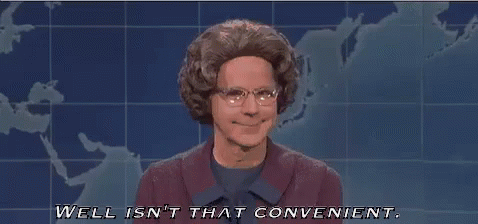


keep going, Gary.
When you are doing the right thing, it makes all the sense in the world.
When someone acts in a self-serving manner, there is no consistency and lots of hypocrisy.
Awesome, Gary. Thanks for your really excellent reporting on this subject.
I wish JSX would operate more flights from the Austin FBO they currently operate from. It would be an upgrade from the zoo AUS is becoming.
Parker pushed dei at AA.
He is the reason.
He looks half in the bag.
This is great stuff. We should be encouraging new airlines to startup for the benefit of flyers.
Your headline is bizarre and misleading, and I see absolutely nothing wrong with airlines that have to have their passengers go through TSA screening complaining that an upstart is exploiting a loophole to avoid that screening — and gain a competitive advantage. Frankly, if YOU were running American or Southwest and DIDN’T complain and try to stop JSX from using that loophole, you should be fired.
I would also note that, safetywise, it’s a bad idea for some regional jet passengers to avoid TSA screening while all others have to have it. If the screening is somehow unnecessary, ALL such passengers should be exempt.
Wow, one of the worst airlines in the world trying to hobble better ones. Wow
@Chopsticks, did you actually read Gary’s post or are you just ignoring the parts that that don’t fit your narrative?
Good analysis Gary. And the headline tells it like it is!
For the guy (Parker) who has 3 DWI’s he should not be talking about safety.
@chopsticks – your response does not address the substance of this post, which is that American and Southwest sell the exact same security they’re criticizing, and perhaps to a lower standard
Did anyone do a breathalyzer on Parker before he opened his mouth. Terrorists most likely wouldn’t be bothered to use something like JSX. It doesn’t make a big enough statement and not well known. And if they were so accessible and unsafe we would hear more about it. If anything that has been learned thru history its that sometimes bigger isn’t better. AA is so big the small details get lost. Issues get lost in the many departments and supervisors. Cost are higher. There isnt any personalization for the passengers. It’s not safety Parker and the AA cronies are concerned with. It’s their next paycheck and bonus.
Doug Parker is such a clown.
What AA and WN are selling is a miniscule portion of their business (an afterthought, really), while it is JSX’s entire business.
Look, I think a lot (most?) of what TSA does is security theater, but whatever nonsense we’re going to have should be equally applied. And, for what it’s worth, I don’t think the public would favor a company exploiting a security loophole. They’d think everyone flying commercially should have the same scrutiny.
For some reason, this subject is Gary Leff’s personal bugaboo, with him coming back to it time and again. And every time, he ignores the facts that are contrary to his narrative. He quotes FARs without context, pretending they apply to JSX. Part 135 FARs were written for ACTUAL charter operators, whereas JSX is a SCHEDULED airline masquerading as a charter airline to evade the Part 121 rules other scheduled airlines have to follow. And Gary knows this, but you’ll never hear him mention it.
This is the real reason that other airlines have a problem with JSX’s operation. They’re not trying to get rid of “better” competition; they’re trying to get rid of unfair competition. As a pretend charter airline, JSX gets to do things that other airlines aren’t allowed to, for instance, flying international from Dallas Love. It’s illegal for any other scheduled airline to do this. Not to mention, “charter” airlines have lesser maintenance, training, and record-keeping requirements, etc., all of which save money, allowing more to be spent on the visible product and service. But you won’t hear Gary mention any of this either.
Hey Gary, how about if ALL airlines have to operate under the same rules? Wouldn’t THAT be fair for competition? You know, because you want to be fair and all, make JSX operate under 121 scheduled rules, or let everyone else pretend they’re charter outfits as well, and let them operate under the more relaxed 135 rules? Surely you must be for that, right? Of course, then the FBOs would be jam-packed with everyone’s passengers, and nobody could just show up 20 minutes before flight time is jump on the plane!
Tell the whole story, Gary, and stop cherry-picking facts. We’re on to you.
@Sean Murphy – the regulatory linkage between part 135 and part 380 is intentional, not a loophole or accident and I’ve walked through the regulatory history here. The FAA approved of JSX, so did the TSA, until ALPA, American and Southwest started lobbying against them. 100% within the rules. There’s no credible allegation about safety or maintenance issue with the carrier at all. The complaint is simply that this small carrier is allowed to do things that American and Southwest can’t – but of course American and Southwest have been granted plenty of government privileges not accessible to JSX. LaGuardia slots! Washington National slots! American received about *$10 BILLION* in direct taxpayer cash during the pandemic. Plus they got subsidized landing fees from DFW. Do they really want ‘fairness’? And what about fairness *to customers* as well as to taxpayers?
Wrong again, Gary. Simply LISTING the text of, and the resultant linkage between, Parts 135 and 380 doesn’t demonstrate that the FAA intended to create a workaround, to allow a particular scheduled airline to avoid actually having to comply with the rules actually written for scheduled airlines. It is in fact, the very DEFINITION of a loophole, taking advantage of complex and sometimes contradictory rules to avoid having to comply with the INTENTION of the rules in the first place. It is, as is common in our government, one of numerous unintended consequences of generations of politicians and bureaucrats piling rule upon rule without actually reading them.
Otherwise, there would be no point in even differentiating between Parts 121 and 135, if scheduled airlines could avoid operating under Part 121. How can you keep pretending that’s not the case?
And as I said, you keep avoiding talking about certain aspects. Would you be okay if Southwest and American ALSO pretended to be charter outfits like JSX does? Cutting back on maintenance and training, and flooding FBOs with tens if not hundreds of thousands of passengers skipping TSA security? Are you saying that you’d be okay with that? What could go wrong there?
And listing all the “government privileges” that WN and AA get is another red herring. Those airlines’ slots at DCA and LGA were applied for, and they had to demonstrate that the financial and economic benefits of their service there over other carriers, before those slots were granted. You know what? They’re not exclusive to those two (or any other) carriers like you imply. JSX is welcome to apply for any of these benefits as well. That’s the difference here: no 121 carrier is ALLOWED to even apply to break the rules that JSX doesn’t have to follow.
@Sean Murphy – you make such a simplistic and mistaken argument, ‘these two things look a lot like each other so should be treated the same under regulations.’ That’s not how these things work and it shouldn’t be. Part 135 won’t work for aircraft with over 30 seats. And flying out of an FBO, without TSA, won’t allow connecting to a flight out of the main terminal, which is necessary to transfer to a plane with over 30 seats.
Not only is it intentional that these business models are treated differently – commuter carriers were transitioned to part 121 and there was a conscious decision not to adjust rules for charter, plus Congress was explicit that regulation of charter couldn’t be made more stringent – but it makes a lot of sense that the rules should be different for smaller aircraft with fewer seats that fly shorter distances.
Pilot fatigue isn’t the same flying short hops and sleeping in your own bed versus traveling across multiple time zones. These planes don’t make the same attractive target, and don’t do as much damage in a security event.
You ask, “Would you be okay if Southwest and American ALSO pretended to be charter outfits like JSX does?”
That’s literally the point of this post – that both Southwest and American do sell charter flights and promote skipping TSA. But they couldn’t operate with more than 30 seats under the JSX model. JSX isn’t going to be taking E175s let alone 737s and A321s.
When you talk about “flooding FBOs with tens if not hundreds of thousands of passengers” you do realize that there are over 4 *MILLION* private flights per year in the United States, right?
“slots at DCA and LGA were applied for, and they had to demonstrate that the financial and economic benefits of their service there over other carriers, before those slots were granted. ”
You’ve got to be kidding. A property right – that airlines sell! – was given for FREE by the government, including the right to EXCLUDE other carriers and new entrants and you think that’s not a subsidy?
Convenient you don’t answer the $10 billion in direct taxpayer cash American received during the pandemic.
And no JSX cannot just ‘apply for’ American’s slots at LaGuardia.
“no 121 carrier is ALLOWED to even apply to break the rules that JSX doesn’t have to follow.”
You completely misunderstand this issue. American and Southwest sell charter flights that skip TSA today! And American/Southwest can spin up a part 135 carrier, of course pilot scope that they’ve agreed to means they’ll have higher labor costs.
TSA screening is not optional. You either use the existing TSA checkpoint at the terminal or someone else does it at the private terminal, for an increased fee. The actual screening is not optional, unless the aircraft falls under the maximum capacity (ie JSX’ biz plan).
I feel sorry for Doug. It’s unfortunate that he is choosing defamation to try to find his way into the spotlight.
This analysis falls short in addressing critical nuances. It’s improbable that air carriers would publicly disclose how JSX effectively circumvents TSA security protocols. Moreover, the article curiously mentions (and then ignores) another profound safety dissonance between Part 121 and 135 operations, particularly concerning pilot qualifications. Unlike Part 121 carriers, which adhere to stringent training protocols tailored through Advanced Qualification programs which are driven by robust Safety Management Systems for pilots aged 23-65, JSX lacks commensurate standards. Its pilots may either lack the qualifications for a Part 121 carrier or surpass the age threshold for public flight operations. The FAA imposes seat restrictions on Part 135 operations due to diminished safety and security oversight. While private charters offer unparalleled convenience, consumers should understand the potential disparity in safety and security standards compared to traditional carriers.
@Joe – JSX has a Safety Management System in place. Suggesting otherwise just shows you don’t know what you’re talking about. I have discussed pilot training standards ad nauseam.
– JSX has several recently-retired senior captains from Southwest and American. Also a retired NASA space shuttle commander. They aren’t subject to the age 65 retirement. They do 1-2 short hops and over 90% of flights return to base each night. Far less fatigue than flying for a part 121 carrier across numerous time zones. And fatigue is a real issue, far more than age of pilots who have to pass their medicals.
– And JSX has co-pilots with fewer than 1,500 hours. So does Lufthansa, by the way, flying inside the United States and taking off and landing at U.S. airports every single day. The 1,500 hour rule sure is important, you can rack up many of those hours in a tethered hot air balloon, and most of it is done in clear air and with touch and go landings at the same airports… nothing like commercial flight… in fact much of airline new pilot hire training is meant to train the bad habits picked up in the quest for hours out of these 1,500 hour pilots.